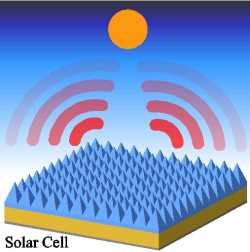Silica Extends Efficiency And Lifespan Of Solar Cells With Passive Cooling
Solar panels get really hot; I've touched mine this summer on my rooftop and it really burns – solar panels could heat up over 100 degrees Fahrenheit on its normal operation. The high temperature will result in shorter lifespan of these panels and reducing its effectiveness to produce power.

A group of Stanford scientists have developed a passive-way of cooling the solar cells without the usage of coolants agent. To achieve passive cooling capability, the surface of solar cells is layered with silica glass – hence reflecting away-unused additional thermal radiations. Silica composition is transparent towards visible light and according to Shanhui Fan, the lead researcher; it can be fine tune to bend and retracts lights.
The thin layer of silica consists of many small pyramid shape objects. During the development phase, the researchers tried out many different sizes of the pyramid to find the right combination that is the most effective. The project is now on outdoor testing phase and I hope one day will make it into consumer's market.
[via OSA]
